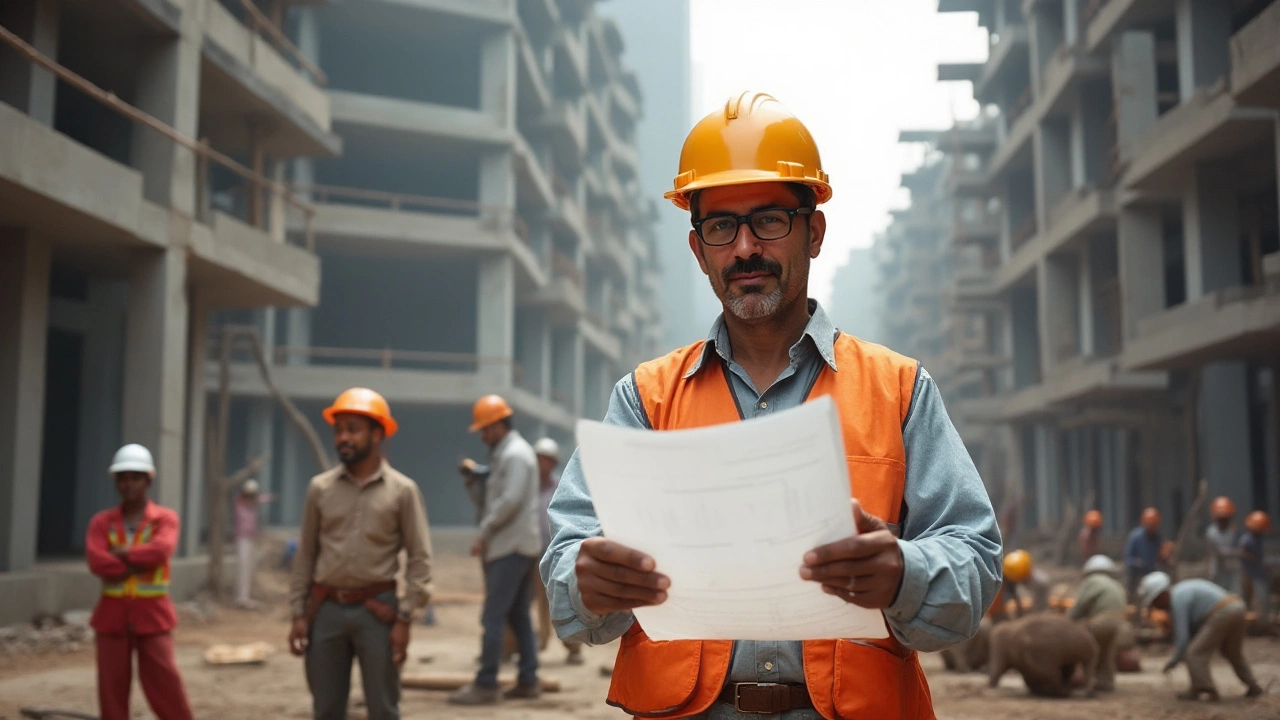In the bustling world of construction, the presence of a building contractor often forms the backbone of successful projects. These professionals are masters of coordination, managing everything from the early stages of planning to the final touches of construction. While their title might suggest they just oversee building activity, their role is far more multifaceted and integral to the entire construction process.
A building contractor ensures that architects, engineers, and various tradespeople work together harmoniously to transform blueprints into structures. Their expertise stretches across multiple facets of construction as they balance quality, budget, and time. Unlike the common perception that contractors simply make sure things get built, they also enforce safety standards and pass multiple hurdles to ensure the structure's integrity.
Understanding the importance of these duties can help anyone involved in construction—from aspiring homeowners to industry professionals—appreciate the meticulous work that contractors do. Knowing how to select the right contractor can make all the difference in achieving a project that meets expectations and aligns with visions.
- Defining a Building Contractor
- Essential Responsibilities
- Skill Sets and Qualities
- Challenges in Construction Management
- Tips for Choosing the Right Contractor
Defining a Building Contractor
A building contractor is the cornerstone of any construction project, proving themselves indispensable long before the first shovel hits the ground. This title is often misunderstood as simply a task overseer. In reality, a building contractor embodies multifaceted roles, including project manager, negotiator, and safety inspector, all wrapped into one. Their journey begins by translating architectural designs into tangible plans, coordinating seamlessly with engineers and other professionals to ensure project requirements are precisely understood and executed. They are the glue that binds myriad elements of construction, transforming abstract blueprints into reality.
While their job may seem rooted solely in physical construction, contractors also shoulder the responsibility of financial stewardship. They meticulously budget across different areas such as materials, workforce, and unexpected contingencies. Rather than being mere bystanders, they are deeply entrenched in decision-making, often negotiating with suppliers to minimize costs without compromising quality. According to a report by the Construction Management Association of America, efficient cost control by contractors can result in up to 20% savings in project expenses.
One cannot ignore the differences that distinguish residential building contractors from those working in commercial sectors. While their core responsibilities remain similar, residential contractors often focus more on the specific details of home-building which require a personal touch, honing on comfort and style that reflects the homeowner's desires. Meanwhile, their commercial counterparts might deal more with scalability and systemic efficiency. As stated by Construction Dive, a significant trend in 2024 has been the growing demand for contractors skilled in green building technologies, underscoring the need for adaptability in skill sets. Hiring a contractor who understands sustainable building practices is more paramount than ever.
In understanding the essence of a building contractor, we see that they act as architects of not just buildings, but of relationships as well. They command the respect of diversified teams that include subcontractors, vendors, and clients alike. This aspect of the job requires excellent communication skills and emotional intelligence, often overlooked in conventional job descriptions. Without their ability to bridge gaps between different stakeholders, aligning visions would remain a pipedream. In the words of renowned architect Frank Lloyd Wright, "The architect should strive continually to simplify; the ensemble of the rooms should then be carefully considered that comfort and utility may go hand in hand with beauty."
While these words were intended for architects, they ring equally true for building contractors, whose dedicated labor shapes the spaces we inhabit.
Essential Responsibilities
Stepping into the shoes of a building contractor, one might be surprised by the breadth of responsibilities they shoulder. At the forefront, these professionals serve as orchestrators of construction endeavors, ensuring that every element aligns perfectly to culminate in a successful project completion. Their duties begin from the onset of a project and stretch far beyond the mere physical building process. A contractor is first and foremost an adept planner, deciphering complex blueprints and allocating resources judiciously to translate a vision into reality. They liaise consistently with clients, providing updates and adjustments to ensure transparency and manage expectations effectively.
A critical component of a contractor's job is cost estimation. They must procure and order materials, hire the right tradespeople, and juggle contracts, all within the budgetary confines established beforehand. Mismanagement in this phase can lead to cost overruns, impacting the project's financial health and potentially stalling the entire process. A successful contractor will also meticulously schedule activities down to the minute detail, optimizing labor and reducing any potential wastage of precious resources.
Another indispensable part of their job is risk management. On a construction site, myriad dangers lurk, from faulty equipment to unforeseen weather disturbances. A building contractor is tasked with concocting contingency plans and ensuring a compliant, safe working environment adhering to local regulations. With such critical oversight, they mitigate the chances of accidents, reduce liabilities, and foster a safe environment not just for workers, but for the future occupants of the structure. As a construction maestro, their role in quality assurance ensures every aspect of the build meets both legal guidelines and exceeds the client's aspirations.
Coordination and Communication
Successful execution of projects also hinges on a contractor's ability to seamlessly integrate and coordinate diverse teams. They must foster collaborative worksites among architects, engineers, and a diverse crew of skilled tradespeople. Open channels of communication ensure that everyone involved is on the same page, which is vital in environments where delays and miscommunications can escalate costs swiftly.
According to the American Institute of Architects, 'Effective communication in project management is one of the core determinants of success.'Such dialogues extend to resolving disputes swiftly and negotiating differing perspectives to keep everyone aligned towards the common goal.
A building contractor's responsibility for overseeing quality cannot be overstated. They implement strict quality checks at each phase of construction, ensuring materials, techniques, and end products meet high benchmarks. This adherence to quality not only guarantees structural integrity and longevity but also safeguards the contractor's reputation. Implementing a strong quality assurance program ultimately adds value and trust to their service, engendering faith among future clientele.
Moreover, contractors often find themselves immersed in administrative duties that are crucial, yet less visible to the outside observer, such as acquiring relevant permits and handling legal documentation. They essentially act as a mediator to harmonize complex interactions between governmental bodies, suppliers, and the labor force. With the essential responsibilities spanning such vast and intricate terrains, the true value of a building contractor becomes evidently indispensable, shaping the heart and soul of the construction endeavor.

Skill Sets and Qualities
In an ever-evolving construction landscape, a building contractor excels not merely by being knowledgeable, but by possessing a versatile array of skills and personal qualities that are vital for success. One fundamental skill is project management, where the contractor juggles schedules, resources, and personnel to ensure everything aligns with the planned timeline. A knack for keeping projects running smoothly demands exceptional organizational skills, where knowing exactly when to deploy workers, materials, and machinery can make or break a project's efficiency.
Moreover, communication stands at the heart of a contractor's role. Being able to clearly convey plans and expectations to a diverse group—from architects and engineers to laborers on the site—is crucial. Listening to concerns and feedback plays an equally significant role. In a field where misunderstandings can lead to costly setbacks, clear articulation becomes more than a skill; it turns into an indispensable quality. Speaking of adaptability, a well-rounded contractor must be comfortable with last-minute changes. Construction sites are rife with unpredictable challenges, from weather impacts to supply chain hiccups, requiring quick thinking and flexibility.
Safety awareness cannot be overstated enough. Contractors are vanguards of site safety, ensuring compliance with regulations and protecting the well-being of all involved. This requires sharp attention to detail and proactive measures to identify and mitigate potential hazards before they escalate into serious issues. Coupled with leadership, contractors must inspire their teams, providing motivation while managing various perspectives and skills, to harness a well-synchronized workforce.
Qualifications and Experience
Aspiring contractors often come with diverse educational backgrounds, although a degree in construction management or civil engineering is often beneficial. Such formal education provides a foundation, but on-the-job experience truly shapes a contractor's expertise. Witnessing firsthand how intricate projects unfold, while learning from seasoned mentors, imbues these professionals with invaluable insights. There's an old saying in the industry: "Experience is the best teacher," but this doesn't mean constant formal learning becomes obsolete. Rather, it's a lifelong journey that contractors commit to, continuously updating themselves about the latest tools, technologies, and industry standards.
"The measure of a great contractor lies not just in skills, but in how they turn vision into reality," said renowned architect Frank Gehry.
Technical prowess is a given, encompassing a deep understanding of construction methodologies, materials, and innovative technologies. Yet, an aptitude for financial management is equally crucial. Many might overlook this aspect, but an adept contractor masters budgeting, ensuring financial resources are optimally allocated to thwart any prospect of waste or debt—a balance between cost-effectiveness and quality never easy to maintain.
Even the industry's seasoned veterans emphasize ongoing training and certifications, which help in keeping skills sharp and abreast of modern advancements. This commitment to professional growth fosters a reputation of reliability and trust—qualities indispensable in procuring new projects and maintaining fruitful partnerships.
Challenges in Construction Management
Within the realm of construction management, building contractors frequently encounter a series of intricate challenges that test their expertise and flexibility. One of the most pressing issues is the coordination of diverse teams, each bringing their own unique timelines and capabilities to the table. Ensuring seamless communication across architects, engineers, and subcontractors is paramount, yet achieving this often feels like orchestrating a symphony where each musician plays from a different sheet. Miscommunication can lead to delays or costly errors, so effective contractors develop strong interpersonal skills and robust communication strategies to streamline these interactions.
Another significant challenge that building contractors face involves staying within the initial project budget. Despite meticulous planning, unforeseen expenses can creep in, whether due to legal constraints, material shortages, or unexpected weather conditions. Contractors must be adept in financial management, constantly negotiating prices and seeking cost-effective solutions without compromising on quality. It is a delicate balancing act that requires contractors to be both financially savvy and diplomatically persuasive. Prioritizing expenditure and maintaining clear records is key to navigating these monetary hurdles.
The dynamic nature of the construction industry also means that building contractors must be adaptive, accommodating changes with agility. Whether technological advancements introduce new methods or regulations evolve, those in construction management must remain informed and flexible. Contractors often participate in ongoing education initiatives, workshops, and industry seminars to keep abreast of current trends and regulatory requirements. Many contractors attest to the fact that knowledge is not just power, but a necessity in staying competitive and compliant.
"In the construction world, the unexpected is the norm, not the exception. Managing such unpredictability requires not only skill but also a mindset prepared for adaptation," shared renowned architect, Frank Gehry.
Safety regulation adherence is another critical challenge, requiring contractors to frequently assess and re-evaluate practices on-site. The construction industry is notoriously hazardous, making strict compliance not just a legal obligation but a moral one. Contractors develop risk management protocols to ensure workers' health and safety, conducting routine inspections and fostering a culture of awareness. Their responsibility lies in protecting lives while delivering on project promises.
Moreover, building contractors must tackle the twin pressures of time and quality. Deadlines loom large, sometimes dictating feverish work paces that can inadvertently affect the quality of the build. Contractors must efficiently allocate resources, scheduling work in a way that adheres to timelines without sacrificing the integrity of the finished project. This tension between speed and precision is a challenging part of their role, requiring detailed planning, foresight, and sometimes, tough decision-making.
Amid these challenges, technology emerges as both an ally and a disruptor, offering solutions yet demanding adaptation. The integration of digital tools, such as Building Information Modeling (BIM), helps track project progress and predict potential setbacks, providing a lifeline in managing complex processes. Yet, contractors need to develop technological fluency to leverage these tools effectively, continuously updating their tech competency to remain at the forefront of the industry.

Tips for Choosing the Right Contractor
Selecting the right building contractor is a critical step toward ensuring the success of your construction project. The decision can often be overwhelming, especially with the myriad of choices available in the market. Knowing what to look for can help demystify the process, enabling you to make an informed decision that aligns with your project goals. First and foremost, it's essential to check the contractor's credentials. Ensure they possess the necessary licenses and certifications required in your area. An unlicensed contractor can lead to a slew of problems, from legal disputes to compromised safety standards, so this step cannot be overstated.
Experience is another crucial factor when selecting a construction management expert. A contractor with a well-established track record is more likely to deliver quality work and handle unforeseen issues effectively. Ask for references and take the time to contact past clients. Previous clients can provide invaluable insights into the contractor's reliability, work ethic, and adherence to timelines. Additionally, consider their specialization; some contractors might excel in residential buildings, while others might have more expertise in commercial projects. Matching this specialization with your project requirements is key to achieving optimal results.
Communication plays a pivotal role in any successful construction project. The ideal contractor should be transparent, keeping you in the loop throughout each phase. Look for someone who is approachable and willing to discuss every aspect of the project with you. They should be able to explain technical details in layman's terms, allowing you to grasp the project's progress and potential hurdles easily. Miscommunication can lead to costly mistakes and delays, so prioritizing effective communication can't be overlooked.
Understanding the cost is equally important. A contractor should provide a detailed estimate that outlines all potential expenses. Be wary of any estimates that seem unusually low, as they may indicate subpar materials or shortcuts that could affect your project's quality. It's often a good idea to get multiple quotes to ensure the price is just right. Remember, a higher bid doesn't always translate to better work, so balance price considerations with the contractor's reputation and demonstrated capabilities.
As the Royal Institution of Chartered Surveyors notes, "A transparent and detailed contract reduces the potential for disputes and ensures both parties are clear on their responsibilities."
Finally, trust your intuition. After meeting with several contractors, you might find yourself gravitating toward one in particular. Your contractor should be someone you're comfortable working with over an extended period. Trust goes a long way in construction projects, laying the groundwork for an effective collaboration. Consider these tips, weigh your options carefully, and you'll be more equipped to choose the right contractor who can transform your vision into reality. Ultimately, investing your time in the selection process is worthwhile, as the right contractor can make all the difference in achieving a successful and satisfying construction outcome.

Written by Fletcher Abernathy
View all posts by: Fletcher Abernathy